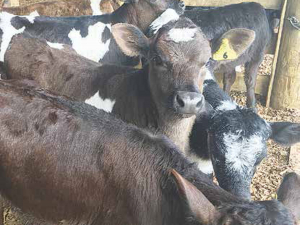Probiotics help calf rearing systems
Success in calf rearing is often measured by minimising health issues and achieving target weaning weights.
 Calves grown faster in the first few weeks of their life lay down better tissue in the developing udder, and milk better as heifers.
Calves grown faster in the first few weeks of their life lay down better tissue in the developing udder, and milk better as heifers.
Farmers are being urged to feed more milk to new-born calves.
Chris Collier, Probiotic Revolution, says this is based on research that shows that calves grown faster in the first few weeks of their life lay down better tissue in the developing udder, and milk better as heifers.
In a University of Illinois study, by initially growing calves faster, heifer milk an protein production increased by 10%.
Collier says Probiotic Revolution uses specific probiotics in Calf Xtreme that helps avoid nutritional scours and other health issues at the high rates of milk. Consequently calves just grow faster and with the product spilling into the rumen of calves, farmers are amazed at how much meal, hay or grass they eat after a couple of weeks, says Collier.
He says that one farmer who fed his calves 8 litres once a day, ran his heifers while out grazing with calves from two other family farms. They all had the same genetic base but at each weighing the 100 Calf Xtreme calves were a month ahead in liveweights compared with the other calves. There were no empties in these 100 calves, but 10 empties in the 150 calves not reared on the product.
Sick calves are also a nightmare and farmers know that when a calf is checked at a young age it does not perform well as a heifer.
"In times of stress or a disease challenge such as rotavirus we just doule the dose rate of Calf Xtreme," says Collier.
Crypto is more challenging and in addition to quadrupling the dose rate other control measures are needed. For coccidiosis a coccidiostat is needed.
Collier claims around 70,000 calves were reared on Probiotic Revolution's products last year and demand is expected to increase this year.
The Meat Industry Association of New Zealand (MIA) today announced that Chief Executive Officer Sirma Karapeeva has resigned from the role.
The winners of the 2026 Hawke’s Bay/Wairarapa Dairy Industry Awards were announced at the annual awards dinner held at Copthorne Solway Park in Masterton on Thursday evening.
Environment Southland is welcoming this week’s decision by the Environmental Protection Authority (EPA) to approve the release of Blaptea elguetai, a leaf‑feeding beetle that will help control the highly invasive Chilean flame creeper.
This March, the potato industry is proudly celebrating International Women’s Day on 8 March alongside the International Year of the Woman Farmer, recognising the vital role women play across every part of the sector — from paddocks and packhouses to research, leadership, and innovation.
Fruit trader Seeka posted a record profit and returns to shareholders in 2025.
Recent weather events in the Bay of Plenty, Gisborne/Tairawhiti, and Canterbury have been declared a medium-scale adverse event.
OPINION: Staying with politics, with less than nine months to go before the general elections, there’s confusion in the Labour…
OPINION: Winston Peters' tirade against the free trade deal stitched with India may not be all political posturing by the…